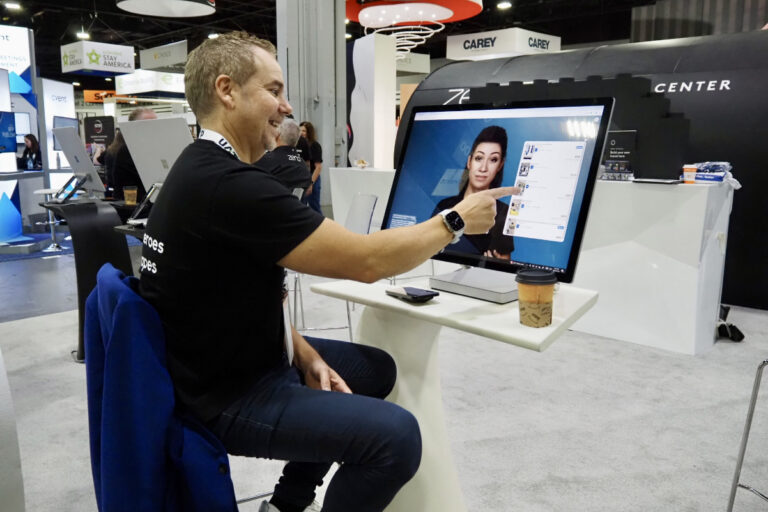Skift Take
Maybe one day a computer-generated avatar will explain why you can’t fly business class to Dubai. Meanwhile, travel management and travel technology companies are testing how to apply Gen AI to different parts of business travel.
Sean O’Neill
The on-screen travel agent looked and sounded like a video game character, but asked and answered travel-booking questions at human-like speed. Zeno, a computational travel agent from technology company Serko, harnessed the power of generative artificial intelligence (AI) to recommend suitable hotels for an upcoming trip.
I saw a demo of the live tool on Wednesday at the Global Business Travel Association conference in Atlanta, and it was one of many examples I saw of how generative AI innovations are impacting corporate travel: The entire travel tech stack is getting an AI treatment, from messaging, policy compliance, expense reporting, and even rebookings during disruptions.
Below are some examples of how AI is being applied to business travel processes that we heard from leading companies on the convention floor:
1. Messaging
“Using Gen AI to answer travelers’ questions is critical because messaging can be an asynchronous channel, where travelers may see a response 20 minutes after submitting a request and have more questions,” said John Pelant, EVP and chief experience and technology officer at travel management company CWT.
“So having Gen AI available will allow travelers to get quick answers to standard questions as a complement, which will be much more efficient,” Pelant said. “But of course it’s a complement, and we’ll still bring in our travel counselors who have their own insights to address more complex questions.”
2. Select your travel option
Travelport, a technology company that provides booking software for travel agencies, introduced a feature this month called Content Curation Layer (CCL) that leverages AI to improve travel search by quickly sorting through billions of options to find the best fit for customers.
CCL is part of Travelport’s core platform and uses AI and machine learning to help travel agents compare flights, hotels and car rentals more quickly. Travelport claims that CCL works faster than regular airline search responses and helps identify the most relevant offers for each traveller.
3. Maintaining Compliance
Amex GBT is working to use Gen AI to extract information from itinerary booking requests sent by business travelers via email.
The company is testing a way to essentially feed these details into its platform so that its online booking tool only shows travel options that comply with a business traveler’s travel policies, eliminating the need for advisors to read emails and manually enter information.
4. Expenses
Business travelers dread submitting expense reports. But when the various tools are synced, the process becomes simpler. Technology integrations allow suppliers like airlines and hotels to send electronic receipts directly to expense reports required by companies. Ideally, business travelers should be able to simply click items via their travel management software to submit.
But today, most aren’t integrated, which is where Gen AI comes in: Travelers can take a photo of their receipt and it performs a better analysis than OCR (optical character recognition) could ever perform on its own.
“No two receipts are the same, even if they’re from the same hotel brand, and now we’re using GEN AI to more accurately capture details and match them with the information entered by the traveler,” said Charlie Sultan, president of Concur Travel. “Our match rates are orders of magnitude better than before.”
In short, Gen AI can reduce the headaches, disputes, and delays that business travelers have when submitting expense reports — a process that many travelers dream of being fully automated.
Visa and travel document support is another area where Gen AI could similarly reduce the need to touch paper.
5. Recovering from travel disruptions
Artur, a travel management company run by Certares-owned Internova Travel Group, has unveiled a new AI-based tool to help travelers recover when their flights are delayed or canceled.
Altour’s new AI Predict tool is built to send predictive alerts and advice about potential travel disruptions and delays, while the new AI Respond tool responds quickly to requests like booking confirmations and alternative options to flight cancellations as travelers attempt to rebook during disruptions.
6. Conference Venue Booking
Groupize, a maker of software tools that help small businesses book meetings, released a new product last week that shows a novel use of AI.
Groupize Pro uses AI to capture venue information and help event planners keep track of what’s important at a venue. The AI-powered feature aims to quickly collect and surface relevant and up-to-date information about the venue to platform users.
7. Travel Policy Education
Altour’s new product, AI Transform, is a tool to aid in travel program compliance. The tool allows travel managers to create and update video content that drives policy compliance in a particularly compelling way. The tool creates white-labeled mini-videos with lifelike avatars that explain the policies.
Though still in its early stages, the concept is promising. Potential travel managers may not be trained in the marketing skills to communicate the company’s travel policies in a way that employees will understand and follow. Content created with the help of Gen AI can solve this challenge and provide the opportunity for instant language translation in companies that span many countries.
Others see the potential for AI to simplify understanding travel policies and interpreting fare rules.
“Large language models are great for asking, ‘I need to fly to Paris next week, can I fly business class?'” explains Concur Travel’s Sultan.


